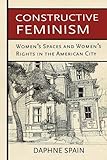Constructive Feminism : Women's Spaces and Women's Rights in the American City / Daphne Spain.
Material type: TextPublisher: Ithaca, NY : Cornell University Press, [2016]Copyright date: ©2016Description: 1 online resource (280 p.) : 11 halftones, 4 maps, 1 tableContent type:
TextPublisher: Ithaca, NY : Cornell University Press, [2016]Copyright date: ©2016Description: 1 online resource (280 p.) : 11 halftones, 4 maps, 1 tableContent type: - 9781501704130
- Feminism and architecture -- United States
- Feminism -- United States -- History -- 20th century
- Feminist geography -- United States
- Public spaces -- United States -- History -- 20th century
- Urban women -- United States -- History -- 20th century
- Women and city planning -- United States -- History -- 20th century
- Women's rights -- United States -- History -- 20th century
- U.S. History
- Urban Studies
- SOCIAL SCIENCE / Sociology / Urban
- feminism, second wave, segregation, radical activists, women, wives, mothers, labor force
- 305.42097309/04 23
- HQ1421 .S6753 2016eb
- online - DeGruyter
| Item type | Current library | Call number | URL | Status | Notes | Barcode | |
|---|---|---|---|---|---|---|---|
 eBook
eBook
|
Biblioteca "Angelicum" Pont. Univ. S.Tommaso d'Aquino Nuvola online | online - DeGruyter (Browse shelf(Opens below)) | Online access | Not for loan (Accesso limitato) | Accesso per gli utenti autorizzati / Access for authorized users | (dgr)9781501704130 |
Frontmatter -- Contents -- Preface -- Acknowledgments -- Introduction: Spatial Consequences of the Second Wave -- 1. Feminist Practice: Social Movements and Urban Space -- 2. Women’s Centers: Nurturing Autonomy -- 3. Feminist Bookstores: Building Identity -- 4. Feminist Health Clinics: Promoting Reproductive Rights -- 5. Domestic Violence Shelters: Protecting Bodily Integrity -- 6. After the Second Wave: Necessary Spaces -- Appendix A: Data Sources for Figure 3 -- Appendix B: Women’s Centers, 1973 -- Appendix C: Feminist Bookstores, ca. 1980 -- Appendix D: Feminist Health Clinics, 1975 -- Notes -- Index
restricted access online access with authorization star
http://purl.org/coar/access_right/c_16ec
In Constructive Feminism, Daphne Spain examines the deliberate and unintended spatial consequences of feminism's second wave, a social movement dedicated to reconfiguring power relations between women and men. Placing the women's movement of the 1970s in the context of other social movements that have changed the use of urban space, Spain argues that reform feminists used the legal system to end the mandatory segregation of women and men in public institutions, while radical activists created small-scale places that gave women the confidence to claim their rights to the public sphere.Women’s centers, bookstores, health clinics, and domestic violence shelters established feminist places for women’s liberation in Boston, Los Angeles, and many other cities. Unable to afford their own buildings, radicals adapted existing structures to serve as women’s centers that fostered autonomy, health clinics that promoted reproductive rights, bookstores that connected women to feminist thought, and domestic violence shelters that protected their bodily integrity. Legal equal opportunity reforms and daily practices of liberation enhanced women’s choices in education and occupations. Once the majority of wives and mothers had joined the labor force, by the mid-1980s, new buildings began to emerge that substituted for the unpaid domestic tasks once performed in the home. Fast food franchises, childcare facilities, adult day centers, and hospices were among the inadvertent spatial consequences of the second wave.
Mode of access: Internet via World Wide Web.
In English.
Description based on online resource; title from PDF title page (publisher's Web site, viewed 26. Apr 2024)


